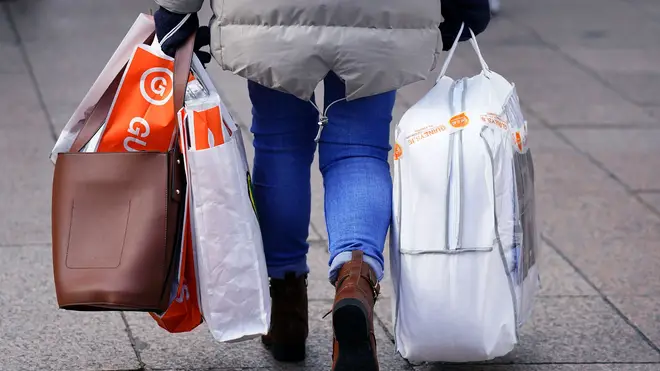
James O'Brien 10am - 1pm
6 June 2023, 00:04

Total UK retail sales increased by 3.9% last month, below the three-month average growth of 4.7%, according to the BRC-KPMG Retail Sales Monitor.
May’s trio of bank holidays failed to get shoppers spending as sales growth slowed to its lowest level in six months, latest figures show.
Total UK retail sales increased by 3.9% last month, against a decline of 1.1% in May 2022 and below the three-month average growth of 4.7%, according to the BRC-KPMG Retail Sales Monitor.
Food sales were up 9.6% on a year ago, boosted by the coronation but still not sustained across the month.

Meanwhile, growth in discretionary spending continued to tumble as the high cost of living squeezed households.
The gloom continued for online retailers with just four categories registering positive sales figures and total sales down by 3%.
There was cause for some optimism, however, as brighter weather at the end of the month led to a much-needed pick-up in summer fashion sales, as well as gardening and DIY products.
British Retail Consortium chief executive Helen Dickinson said: “With consumer confidence still recovering from record depths, and continued tightening of household incomes, we are unlikely to see substantial sales growth in the coming months.
“But, with signs that inflation has possibly peaked, retailers are hopeful that confidence will continue to improve.”
Paul Martin, UK head of retail at KPMG, said: “Despite warmer weather, a national celebration and month of bank holidays, retailers saw pretty mild growth in May with sales figures up just 3.9% on last year, and lower than the 5% growth seen in April.
“Retailers will be hoping that inflation levels in the wider economy continue to move in the right direction in order to boost much-needed consumer confidence.
“The wild card for the retail sector remains uncontrollable food inflation, which shows little sign of coming down in the near future, and this is having a significant knock-on effect on non-essential spending.”
Separate figures from Barclays show consumer card spending grew just 3.6% year-on-year in May, down from April’s 4.3%, as Britons cut back on discretionary purchases to cope with mounting inflation and food prices.
However, May’s long bank holiday weekends provided a welcome uplift to pubs, bars and clubs and the entertainment sector, while both digital content and takeaways enjoyed their highest growth so far this year.
Aside from the near-record 19.1% food inflation, Barclays also found that grocery spending received a boost from the coronation bank holiday weekend and Eurovision.
Spending on fuel saw its third consecutive month of decline, down 10.7% on last May, largely thanks to the drop in prices.
Amid ongoing concerns around rising food prices, Barclays found that 65% of shoppers have noticed that some products are now being sold in smaller package or portion sizes while costing the same or more than before.
The products most frequently cited as being impacted by ‘shrinkflation’ are chocolate, crisps, biscuits and snack bars.
In response, a fifth of consumers (20%) are switching away from products which have been downsized by manufacturers in favour of buying products in bulk which offer better value for money.
Esme Harwood, director at Barclays, said: “Consumers are still paying close attention to their everyday spending, and we are seeing growing concerns around ‘shrinkflation’ in the weekly shop.
“Many are having to forgo discretionary purchases to offset rising food prices, with clothing and restaurants most impacted.
“However, the growth witnessed at pubs, airlines and entertainment venues shows that Brits are still finding room in the budget to enjoy nights out and holidays.”